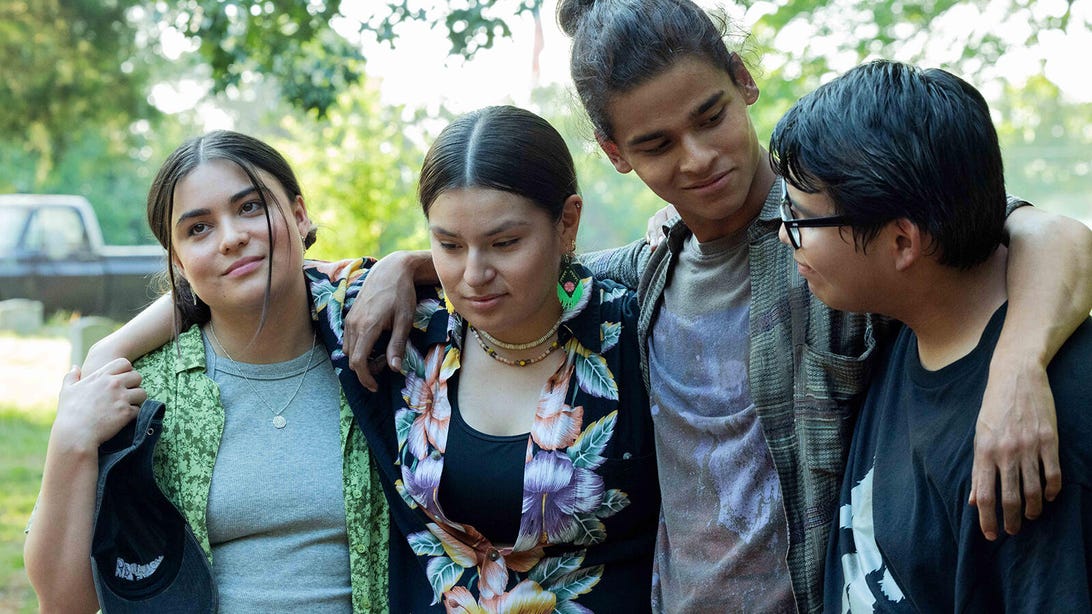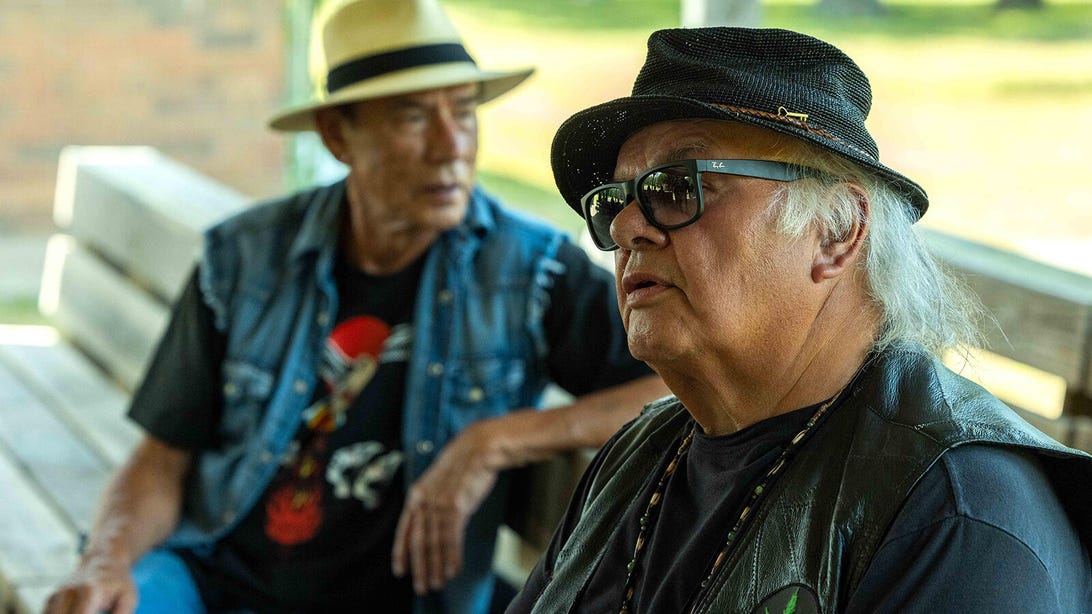Join or Sign In
Sign in to customize your TV listings
By joining TV Guide, you agree to our Terms of Use and acknowledge the data practices in our Privacy Policy.
Reservation Dogs Kept Opening Its Arms
The FX/Hulu series taught its characters how to embrace community

Devery Jacobs, Paulina Alexis, D'Pharaoh Woon-A-Tai, and Lane Factor, Reservation Dogs
Shane Brown/FX[Warning: The following contains spoilers for the series finale of Reservation Dogs, "Dig."]
Reservation Dogs only needed three seasons to grow up. Sterlin Harjo and Taika Waititi's extraordinary series came in hot in 2021; the first scene found the Rez Dogs — D'Pharaoh Woon-A-Tai's Bear, Devery Jacobs' Elora, Paulina Alexis' Willie Jack, and Lane Factor's Cheese — mid heist, stealing a chip truck to finance their dream of moving to California. This was the show revving its engines, confidently pulling viewers into a world that quickly revealed itself to be more rambling and low-key than those early hijinks might suggest. The Rez Dogs thought they knew where they were headed, but the community around them kept changing their plans.
The first season vibed like an indie-style hangout comedy. It was blended with magical realism and deep emotion, but it took the shape of a chill show about teens getting into scrapes. But the joke about hangout comedies is that they're usually so insular — they're all about friend groups who never seem to hang out with other people — and being insular ran counter to Reservation Dogs' whole ethos. The kids started out feeling like they were on their own; they'd lost their friend Daniel (Dalton Cramer) to suicide, and they blamed it on their rural Oklahoma town, which they saw as a dead end. "F--- this town, Bear. You don't owe anyone anything," Elora argued in the first episode. She relented the next day, though, agreeing to try to help the truck driver who'd become collateral damage in their scheme. Again and again, they let the village pull them back. Of course they owed each other.
The structure of the show taught the lesson. As fun as its young leads were when they were together, Reservation Dogs was at the height of its power when it split up the Rez Dogs, dropping them into punchy short stories: Elora gets her driver's license, Willie Jack goes hunting with her father, Bear gets lost, Cheese is sent to a group home. Episodes swerved in unexpected directions, sending the teens on shaggy side quests where they learned they couldn't help themselves without helping their elders. Occasionally, all of the teens were sidelined; in Season 2, the aunties let down their hair at an IHS conference, and lighthorseman Big (Zahn McClarnon) took a psychedelic trip. California faded into the periphery as the community came into sharper focus.
On one level, Reservation Dogs' elastic tone was a vibrant middle finger to Hollywood's stoic Native stereotypes. Its pop culture homages — to sci-fi adventures, action flicks, bloody horror dramas, and coming-of-age comedies — reclaimed archetypes of American filmmaking and refocused them on Indigenous people. But the show unearthed a sense of loss at the core of every genre. Reservation Dogs was steeped in cultural dispossession and personal grief, especially for Daniel and for Elora's mom, Cookie (Janae Collins), who died in a motorcycle accident when Elora was young. Even when the series expanded its point of view beyond the Rez Dogs, it only exposed how many other people in their town were mourning the same tragedies. In that sense, the show's range was also a testament to all the ways each death reshapes the world, and to grief's terrible persistence in every aspect of life.
By the third and final season, the same grief that made the Rez Dogs want to run away from their community had become what tied them to it. (There was a running gag where every adult on the show seemed to be reading the same book; how could the loss of one life not be felt by everyone in a village that connected?) Bear, Elora, Willie Jack, and Cheese finally went to California and back; they returned wiser, more settled, and a little less central to the story. The space they opened up was filled by the elders. A Dazed and Confused-style '70s flashback episode positioned the elders as mirror images of the Rez Dogs, with one key difference: They'd lost a friend who was still alive. By reuniting Bucky (Wes Studi), Irene (Casey Camp-Horinek), Brownie (Gary Farmer), and Old Man Fixico (Richard Ray Whitman) with estranged pal Maximus (Graham Greene) in the present, the Rez Dogs — and Reservation Dogs — bookended Daniel's death with hope. In a season that also dove into the brutal legacy of residential schools, the reunion of old friends was healing: a gift not given to everyone.

Wes Studi and Gary Farmer, Reservation Dogs
Shane Brown/FXStill, Reservation Dogs ended with a funeral. It had to. The series finale is the ultimate answer to the question of what the characters owe each other, as Fixico's death brings everyone into the same space for a communal ceremony. It's also a chance to repair what seemingly went wrong when Cookie and Daniel died. While sitting vigil for Elora's grandma Mabel (Geraldine Keams) in Season 2, Elora's aunt Teenie (Tamara Podemski) and Big acknowledged that the group hadn't come together after Cookie's death. "Really ended everything," Big said. The show was haunted by that breakdown. When Elora ran away, there was a horror movie quality to the way her nightmares flashed with a memory of Daniel's funeral. That image of his casket at the front of the church is echoed in the lingering presence of Fixico's casket in the final episode, as if to close the loop.
There's a beautiful, easy familiarity to the finale. Harjo, who directed the episode and co-wrote it with Chad Charlie, goes for slice-of-life intimacy over big drama. There are tasks to complete: digging (the title of the episode is simply "Dig"), cooking, talking. Elora's first appearance is in the distance, unloading a car. The Rez Dogs each got their moment in the spotlight this season, but it's fitting that the finale sums up their growth by widening the lens, surrounding them with crowds of family and friends. The show's last scene doesn't feature the Rez Dogs at all; it's Bucky, Irene, Brownie, and Maximus, celebrating the fact that they sent off their friend the right way. Then again, there are so many parallels between the elders and the Rez Dogs that the scene feels just as much like a look at Bear, Elora, Willie Jack, and Cheese decades down the line. Reservation Dogs ends on the elders, and so it ends on the Rez Dogs.
Again, the structure of the show reveals what matters. At the start of the finale, Willie Jack visits Daniel's mother, Hokti (Lily Gladstone), in prison, calling back to the Season 2 stunner "Offerings." Willie Jack has spent the season learning how to be a medicine man from Old Man Fixico, and she's worried that he died before he could teach her his wizard ways. Hokti counters that the everyday things they did together to care for the community — delivering groceries to elders, visiting people at their houses — were the real lesson. Likewise, when Cookie's spirit appeared to Bear's mother, Rita (Sarah Podemski), her message from the great beyond was simply to ask her friend to spend more time with Elora. The lesson of Reservation Dogs is found in the characters it spends time with. As Bear's comical spirit guide, William Knifeman (Dallas Goldtooth), once put it, "That's the Native way of teaching. We have this traditional pedagogy of: just get out there and learn, f---er."
William Knifeman comes to Bear again in the finale. This is goodbye, but not really — goodbye is a "colonial way of talking," in the same way that it's a colonial way of looking at funerals or TV finales. William Knifeman tells Bear that he's proud of him for finding his place in the community. Tellingly, Bear has been distant from William Knifeman for most of the third season, but now, when the elders warn him that whistling at night will call the spirits, Bear whistles. He wants to talk to the spirit. Everyone is welcome.
The series finale of Reservation Dogs is now streaming on Hulu.
